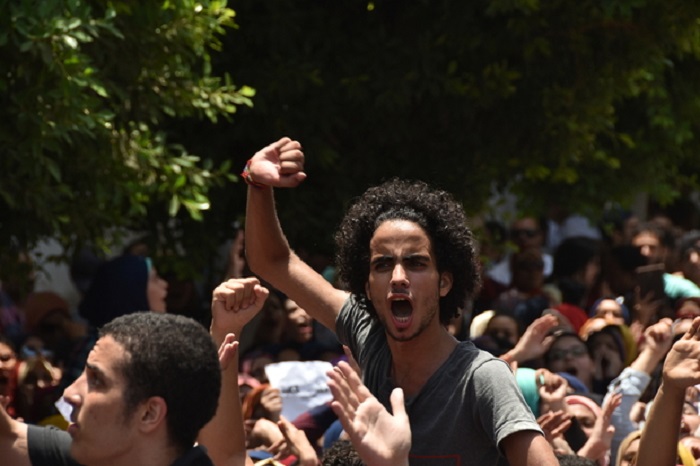Hundreds of teenage Egyptian students gathered in front of the Ministry of Education in downtown Cairo on Monday morning, decrying what they saw as an “oppressive and failing” educational system and demanding that the minister of education “leave”.
A few hours into their protest, as students began heading to Tahrir Square, armoured police vehicles dispersed the crowds of young people with tear gas and chased them into the narrower side roads of Mohamed Mahmoud street.
Eye-witnesses said that police also shot rubber bullets at the protesters and arrested a handful of the students.
Online videos of the dispersal showed the students chanting, “The police are thugs,” police running after female protesters, and students throwing rocks at police.
Local news outlets reported that protests took place in various other governorates across the country, including Arish, Assiut, Alexandria and Port Said.
“How could I not come here today?” one of the student’s mother told Middle East Eye before the dispersal, stressing that the educational system is infested with “injustice”. Many of the demonstrators echoed the claims that the “[educational] system is a failure”.
Egyptian high school students undergo thanweya amma exams in their final year of schooling before entering university. The exams are notorious for forcing stress on students to memorise material and with a highly criticised public schooling system, many students have sought private tutoring lessons to compensate for the gap.
“My father’s money is being wasted,” Ahmed Khateeb told MEE. “Thanweya amma is destructive to households.”
Mustafa al-Hawary, a student and one of the founders of a movement called “the initiative to reform the Egyptian educational system,” said that the students want a comprehensive alteration of the Ministry of Education.
The protest, which consisted of mostly 16- to 18-year-olds and some parents, was triggered by a ministerial decision on Sunday to postpone a mechanical dynamics exam after the students had already taken it.
The ministry said that the decision was made after the exam’s questions and answers were leaked. The move came after a successive amount of leaked exams were delayed, including earlier Arabic and religious studies tests.
Rahma, a thanweya amma student, said that English, physics, chemistry, economics and French exams were leaked as well.
“These leaks happen from inside [the ministry],” one of the protesters said while another added. “It’s not our responsibility that they can’t prevent cheating.”
Earlier in June, public prosecutors ordered the arrest of a university student who managed a Facebook page with half a million followers, entitled “Chao Ming Helps Thanaweya ‘Amaa Students Cheat,” that leaks exam answers and questions to high school students.
The detainee was charged with helping students cheat. Shortly afterwards, the interior ministry announced that it had arrested three more people suspected of managing Facebook pages that facilitate cheating before the exam.
Abdel Hafiz Tayel, who works with the Egyptian Centre for the Right to Education, told MEE that thanweya amma exams have been getting leaked for decades. Turning to a class analysis, he explained that the only difference now is that these leaks are accessible to everyone through social media.
“Thanweya amma has been, for years, has been the only gateway for the poor to enter university,” he said pointing to the fact that “the Ministry of Education itself used to leak the exam questions, and it was in the interests of the children of ministers, celebrities and other governmental officials who got these questions”.
Tayel clarified that social media websites such as Facebook and Twitter allowed the corruption of the ministry to begin reaching wider circles of people, he added. “They [the government] don’t want that.”
Hesham Fouad, a member of the Revolutionary Socialists, said in a press conference at the Egyptian Centre for Economic and Social Rights on Monday that the struggle of the high school students is not isolated from the struggles of society at large.
“All are linked,” he said, adding that it is about a larger phenomenon “of turning the country into a giant military camp”.
[Source: MEE]





 WhatsApp us
WhatsApp us 

